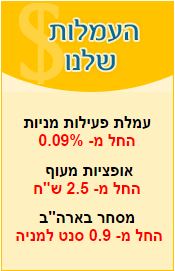| הפוך לדף הבית |  |
כלים לבעלי אתרים |  | תכנה לניתוח טכני |  | פורומים |  | חיסכון בעמלות מסחר |  | מניות מומלצות |  | אודות טלנירי |  | צור קשר |
מבצעיםחדשותגידול של כמעט פי 3 בגניבת רכבים חדשים מודל 2023מערכת טלנירי | 28/9, 20:19 פוינטר מסכמת את רבעון 3 בגניבות רכב בישראל אינטל וטאואר מודיעות על הסכם חדש להרחבת כושר ייצורמערכת טלנירי | 5/9, 21:04 טאואר תרחיב את כושר הייצור שלה בטכנולוגיית 300 מ"מ באמצעות רכישת מכונות שיותקנו במפעל אינטל בניו מקסיקו, כמענה לביקושים גדלים של לקוחות החברה |
טבע תציג נתונים חדשים אודות AUSTEDO® (deutetrabenazine) בקונגרס הפסיכיאטרי 2019 טבע טלנירי | 3/10/19, 12:29 בואו לדבר על זה בפורום בורסה ושוק ההון טבע תעשיות פרמצבטיות בע"מ (NYSE ו- TASE: TEVA) הודיעה היום כי נתונים אודות AUSTEDO® (deutetrabenazine) יוצגו בקונגרס הפסיכיאטרי השנתי ה-32 בין 3-6 לאוקטובר, 2019 בסן דייגו קליפורניה. המצגות יכללו ניתוח נוסף של מרכיבי AIMS (פריטים 8-10) מתוך המחקרים הפיבוטליים ARM-TD ו- AIM-TD אשר בחנו את טבליות AUSTEDOלטיפול בדיסקינזיה מאוחרת בבגירים; ניתוח של השפעת AUSTEDO על פרמטרים מטבוליים בטיפול בדיסקינזיה מאוחרת במחקרים הפיבוטליים וכן במחקר ארוך הטווח; וניתוח של עיצוב מחקר הנסיגה אשר בחן את הישנות ההשפעה הטיפולית של AUSTEDO בדיסקינזיה מאוחרת. נתונים נוספים כוללים שתי מצגות המראות את תוצאות המחקר הראשון אשר מכמת את הסטיגמה אשר אנשים עם דיסקינזיה מאוחרת מתמודדים איתה במצבים מקצועיים וחברתיים. Important Safety Information Contraindications: AUSTEDO® is contraindicated in patients with Huntington’s disease who are suicidal, or have untreated or inadequately treated depression. AUSTEDO® is also contraindicated in: patients with hepatic impairment; patients taking reserpine or within 20 days of discontinuing reserpine; patients taking monoamine oxidase inhibitors (MAOIs), or within 14 days of discontinuing MAOI therapy; and patients taking tetrabenazine (Xenazine®) or valbenazine (Ingrezza®). Clinical Worsening and Adverse Events in Patients with Huntington’s Disease: AUSTEDO® may cause a worsening in mood, cognition, rigidity, and functional capacity. Prescribers should periodically re-evaluate the need for AUSTEDO® in their patients by assessing the effect on chorea and possible adverse effects. QTc Prolongation: Tetrabenazine, a closely related VMAT2 inhibitor, causes an increase in the corrected QT (QTc) interval. A clinically relevant QT prolongation may occur in some patients treated with AUSTEDO® who are CYP2D6 poor metabolizers or are co-administered a strong CYP2D6 inhibitor. Dose reduction may be necessary. The use of AUSTEDO® in combination with other drugs known to prolong QTc may result in clinically significant QT prolongations. For patients requiring AUSTEDO® doses greater than 24 mg per day who are using AUSTEDO® with other drugs known to prolong QTc, assess the QTc interval before and after increasing the dose of AUSTEDO® or the other drugs. AUSTEDO® should be avoided in patients with congenital long QT syndrome and in patients with a history of cardiac arrhythmias. Neuroleptic Malignant Syndrome (NMS), a potentially fatal symptom complex reported in association with drugs that reduce dopaminergic transmission, has been observed in patients receiving tetrabenazine. The risk may be increased by concomitant use of dopamine antagonists or antipsychotics. The management of NMS should include immediate discontinuation of AUSTEDO®; intensive symptomatic treatment and medical monitoring; and treatment of any concomitant serious medical problems. Akathisia, Agitation, and Restlessness: AUSTEDO® may increase the risk of akathisia, agitation, and restlessness. The risk of akathisia may be increased by concomitant use of dopamine antagonists or antipsychotics. If a patient develops akathisia, the AUSTEDO® dose should be reduced; some patients may require discontinuation of therapy. Parkinsonism: AUSTEDO® may cause parkinsonism in patients with Huntington’s disease or tardive dyskinesia. Parkinsonism has also been observed with other VMAT2 inhibitors. The risk of parkinsonism may be increased by concomitant use of dopamine antagonists or antipsychotics. If a patient develops parkinsonism, the AUSTEDO® dose should be reduced; some patients may require discontinuation of therapy. Sedation and Somnolence: Sedation is a common dose-limiting adverse reaction of AUSTEDO®. Patients should not perform activities requiring mental alertness, such as operating a motor vehicle or hazardous machinery, until they are on a maintenance dose of AUSTEDO® and know how the drug affects them. Concomitant use of alcohol or other sedating drugs may have additive effects and worsen sedation and somnolence. Hyperprolactinemia: Tetrabenazine elevates serum prolactin concentrations in humans. If there is a clinical suspicion of symptomatic hyperprolactinemia, appropriate laboratory testing should be done and consideration should be given to discontinuation of AUSTEDO®. Binding to Melanin-Containing Tissues: Deutetrabenazine or its metabolites bind to melanin-containing tissues and could accumulate in these tissues over time. Prescribers should be aware of the possibility of long-term ophthalmologic effects. Common Adverse Reactions: The most common adverse reactions for AUSTEDO® (>8% and greater than placebo) in a controlled clinical study in patients with Huntington’s disease were somnolence, diarrhea, dry mouth, and fatigue. The most common adverse reactions for AUSTEDO® (4% and greater than placebo) in controlled clinical studies in patients with tardive dyskinesia were nasopharyngitis and insomnia. Please see accompanying full Prescribing Information, including Boxed Warning. 



טלנירי מציעה לך את מגוון השירותים תחת קורת גג אחת!
פתיחת חשבון למסחר בארץ ובארה"ב, שירותי איתותים לישראל, ארה"ב והמעו"ף, שירות החזרי מס, תוכנת ניתוח טכני ועוד...
השאר את פרטיך ונחזור אליך בהקדם
כתבות נוספות |













 - מידע פיננסי לפני כולם
© כל הזכויות שמורות |
משרד ראשי: יגאל אלון 94, תל-אביב |
08-936-1736 |
- מידע פיננסי לפני כולם
© כל הזכויות שמורות |
משרד ראשי: יגאל אלון 94, תל-אביב |
08-936-1736 |






